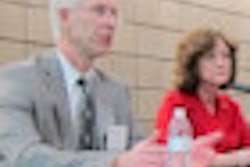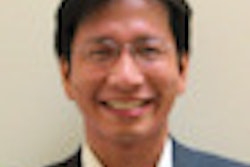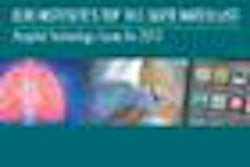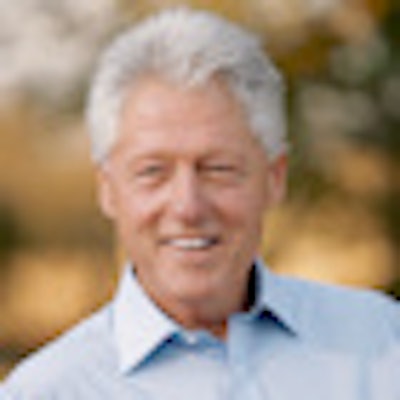
NEW ORLEANS - Information technology is essential to the management of healthcare in the 21st century. It has the power to improve healthcare access and services worldwide for ordinary people, former U.S. President Bill Clinton said on Wednesday in the keynote speech at the Healthcare Information and Management Systems Society (HIMSS) meeting.
Clinton's statement was reminiscent of a comment made at the 1995 HIMSS meeting by Microsoft CEO Bill Gates, as he gave the keynote speech. He told an audience of about 1,000 healthcare IT professionals assembled in San Antonio that he didn't think they had a clue about the revolution in which they were about to participate. You have the power to change the world, Gates chided, telling the audience not to just sit there.
And there has been change. In 1995, 372 vendors displayed their wares to about 10,000 HIMSS meeting attendees. This year, 1,158 vendors did the same to an attendance that to date has topped 34,500. And it felt as if every one of them tried to fill the large auditorium and overflow halls in the New Orleans convention center to hear the former president.
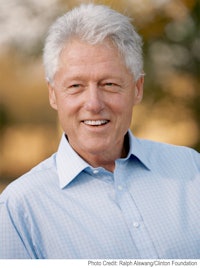 Former President Bill Clinton spoke about the transformative power of IT at HIMSS 2013. Image provided by HIMSS. Photo credit: Ralph Alswang/Clinton Foundation.
Former President Bill Clinton spoke about the transformative power of IT at HIMSS 2013. Image provided by HIMSS. Photo credit: Ralph Alswang/Clinton Foundation.
The traditional method of healthcare delivery has been labor intensive and narrowly focused, Clinton said. However, improving healthcare delivery has been limited by the many hurdles to measuring the results of change. The whole promise of IT is that healthcare data can be managed in new ways, enabling the healthcare industry and government agencies to know what is happening, what is succeeding, and what can be done better, he said.
Over a 10-year period, healthcare IT and the push to adopt electronic record keeping will help align U.S. healthcare costs with those of other nations, Clinton believes. While the U.S. currently spends 17.8% of the gross domestic product (GDP) on healthcare, no other industrialized country in the world spends more than 12%. And the citizens of many of these other countries have better healthcare outcomes.
If healthcare costs can be reduced to 12% of the GDP, about $1 trillion per year will be available to spend on other aspects of the U.S. economy, Clinton said. The average citizen may get a pay raise, as employers will be spending less on insurance policies for those individuals. With IT potentially improving healthcare information and treatment for the average individual, citizens may require less treatment or have improved outcomes. A healthier citizenry could help offset the predicted increase in treatment for an aging baby boomer population.
The revolution in IT throughout the world is finally empowering consumers to get more value at a lower cost. Healthcare IT will be right in the middle of this development.
It's none too soon, Clinton pointed out. The national concern that healthcare costs are spiraling out of control is valid. Most dire scenarios are based on the assumption that healthcare costs will increase at three times the rate of inflation because of population shifts and because they did in the past 10 years.
Clinton compared this with global warming and climate change. In the first decade of the 21st century, insurance losses from weather-related damage were triple the losses in the 1990s. In the 1990s, insurance losses were triple those of the 1980s. "You can't deny climate change," he said. And the country should not deny that if healthcare continues with its same inefficiencies, the same upward trend of spending will occur.
Information technology can reach out and empower in ways that were unthinkable even a decade ago, he said. Low- and middle-income people can have huge clout. When the devastating tsunami struck in South Asia in 2004, billions of dollars were raised in aid, but the median contribution was $56. This was the first time that donations could be made on a global scale.
In 2008, billions of dollars were raised to help Haiti recover from its devastating earthquake. The median contribution was $25, and it was the first time people could donate by texting. This shows how the people of the world can be empowered with the use of technology, explained Clinton.
"Healthcare needs reform," he said. "It's quite chilling when you realize how the absence of technology to provide transparency means that healthcare consumers have no way of knowing what they will be charged, or even what their healthcare options are. One of the most important roles of IT is to empower people to make an impact on the healthcare market, and to know what is going on."
There is nothing wrong that we can't fix, but using horse-and-buggy systems won't help us improve the situation, he emphasized. The thousands of people at HIMSS are sitting in the proverbial driver's seat to make change happen.
Although the former president didn't know it, those who had sat in the San Antonio convention theater 18 years ago may have thought they glimpsed a shadow of Bill Gates standing behind him, nodding his head in affirmation.





